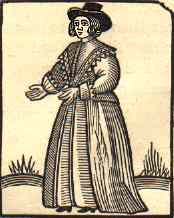Who were the Puritans?
The Puritans were an influential minority of Protestants who were dissatisfied with the Elizabethan Settlement. (One commented that Anglicanism was "a crooked compromise betwixt two religions.") The Puritans desired a simpler Church ritual and doctrine more in line with Calvinism --a return to what they conceived as the "pure" form of the early Christian Church. (However, their name was given to them by their detractors, who scorned "Pure-itan" self-righteousness.)
Defining Anglican or Puritan belief is difficult because both groups had overlapping aims and ideals. There was no common creed that set Puritans apart, and Anglican doctrine was ambiguous by its very nature as a middle ground between two religious extremes.
But despite ambiguities, uncertainties, and differences of opinion (or faith), religious leaders seemed to share a naïve hope: "May God at length grant that we may all of us think the same things*!"
In the same spirit, to promote order and stability, Elizabeth claimed that she strove for a realm without "diversity, variety, contention and vain love of singularity." (From a letter written to Archbishop Parker in 1565.)
(All quotations on this page are found in McGrath, 87, 99, 398.)
Footnotes
-
A difference of opinion
A hope (not fulfilled) of Bishop Grindal, one of the returned Protestant exiles who gained influence in the Church; in 1575 he was appointed Archbishop of Canterbury, but Elizabeth suspended him from office for challenging her authority (he recommended that she consult with the clergy before ruling on Church matters such as the suppression of prophesyings).
